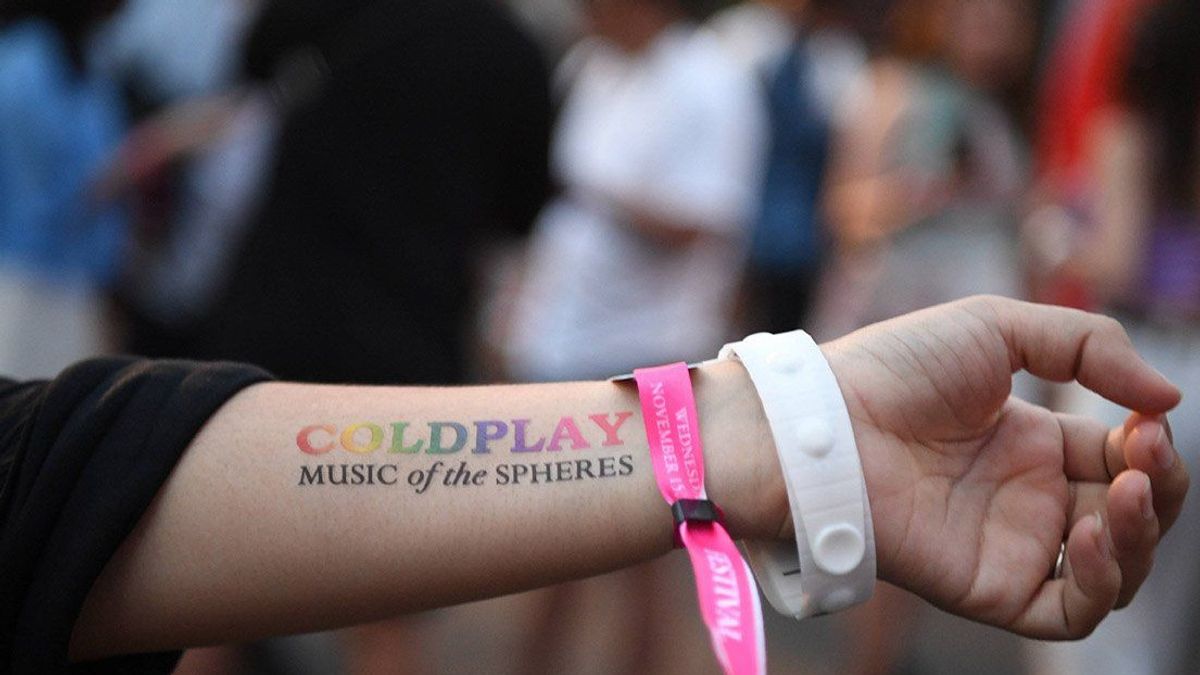JAKARTA The rate of return of Xyloband, an advanced smart bracelet that became a symbol of Coldplay's concert, is said to have opened the curtain of the ethical crisis of the people in Indonesia. But another point of view said that the return rate had absolutely nothing to do with ethics.
Coldplay successfully beat up Indonesian music lovers through its inaugural concert at the Gelora Bung Karno Main Stadium, Jakarta, on November 15, 2023.
However, after the British band counter, there is one big question mark regarding the ethical crisis. The question of this ethical crisis stems from the level of Xyloband's return from concert audiences.
Coldplay management confirmed that the return rate of Xyloband reached 77 percent, after previously circulating rumors that the recovery rate of concert bracelets in Indonesia was only 52 percent.
But still, compared to the average return in the first year of the concert titled Music of the Spheres World Tour which reached 86 percent, the return figure in Indonesia was still not satisfactory.
This means that out of a total of 80,000 spectators at GBK, there are 18,400 of them who did not return the Xyloband. Even though the return of the Xyloband is one of Coldplay's commitments to implement the concept of sustainability at each of their concerts.
"We reduced 80 percent of the band production by collecting, sterilizing, and charging the bracelets after the concert," Coldplay wrote on their official website.
Reflecting on the level of Xyloband's return, crucial questions about ethics and honesty emerged among Coldplay audiences in Indonesia.
Psychologist for the development of children, adolescents and education Theresia Novi Poespita Candra said Indonesia is facing an ethical crisis, with honesty being one of its main victims. According to Novi, returning the Xyloband is a form of ethics, so not doing it is a real example of the ethical crisis in society.
But the ethical crisis is not only reflected in the return of Coldplay's concert bracelets. Daily behavior also often reflects the ethical crisis in society, such as the behavior of littering.
Novi explained that the digital era has a big role in exacerminating this condition. In the midst of the positive impact felt from its presence, technology also has a negative impact on life, one of which is to accelerate everything. This tends to make technology users respond quickly and without thinking.
An example is removing friendships on social media when someone doesn't like or disagrees with that person, regardless of ethics and its impact on social relations.
Back to the context of Xyloband returns. According to Novi, those who did not return the bracelet were one real example of unethical actions, because they did not consider their impact on other parties. Novi said this instant way of thinking was apparently triggered by the technological work that tended to pursue effectiveness and efficiency.
From a psychological perspective, Novi explained that the human brain has a prefrontal cortex, one of which has the task of making ethical decisions.
But the results of studies show that in Indonesia, especially in big cities such as Surabaya and Jakarta, prefrontal cortex children aged 15 years and over tend to be weak due to lack of stimulation through education.
In the midst of criticism about Coldplay's audience ethics that did not restore Xyloband, another view was explained by senior psychologist Tika Bisono.
According to Tika, when someone has witnessed or met an admired and idolized figure for a long time, there will be a feeling of wanting to store items to be remembered later. Not bringing the Xyloband back to the organizers, according to Tika's view more about the attitude of 'wanting to have' something from their idol.
"When someone watches the idol's action it definitely wants to bring something to keep, or the termkeep shake, as a memento," Tika told VOI.
Then when there are items that seem to be 'distributed', most think about bringing them home. Later when he sees the item, he will remember the memorable moment, in this case the concert," he added.
Tika continued, bringing home the Xyloband by some spectators did not show a klepto mentality. Moreover, not a few of them are really looking forward to Coldplay's presence in Indonesia.
He also explained that someone who klepto has no purpose for what items they take. Klepto usually only has the urge to take but the goal is not clear.
"For the Coldplay bracelet case, it could have been an intention not to return it, but this is not a klepto because they brought this bracelet with them for memories, this is a concert that has been waiting for years," he said.
SEE ALSO:
For information, Japan is still the country with the highest percentage of Xyloband returns. As many as 97 percent of the audience returned the Xyloband, and in second place was filled with Copenhagen (Denmark) and Buenos Aires (Argentina) concerts to complete the top three with a percentage of 95 and 93 percent, respectively.
"Regarding mentality and discipline, indeed Japan cannot be doubted. But again, in the case of this bracelet, Indonesia is also not completely wrong because it departs from admiration. The 77 percent percentage is also not too bad, because it means that most of it is still restoring it," concluded Tika.
The English, Chinese, Japanese, Arabic, and French versions are automatically generated by the AI. So there may still be inaccuracies in translating, please always see Indonesian as our main language. (system supported by DigitalSiber.id)















